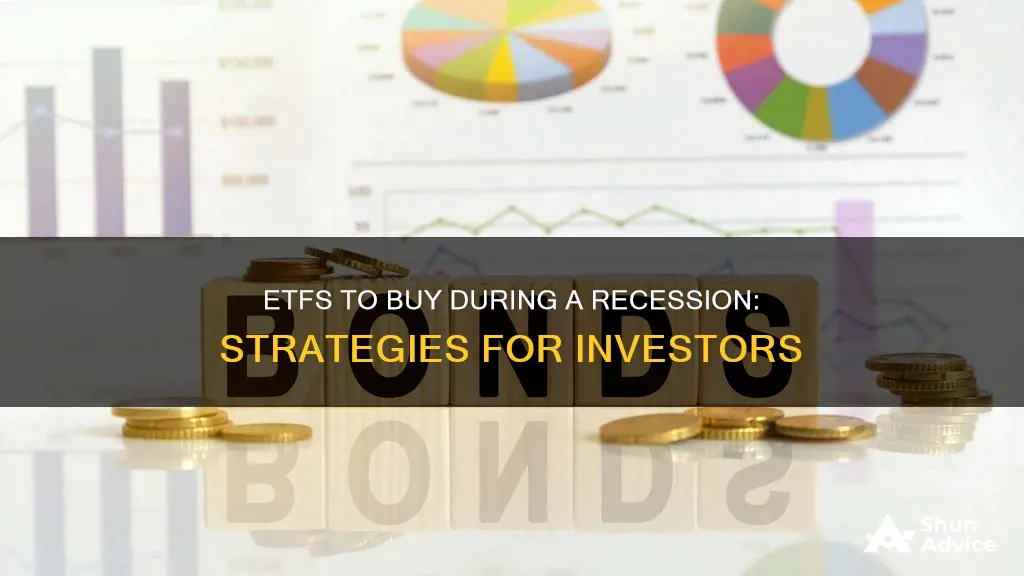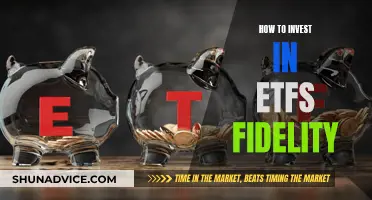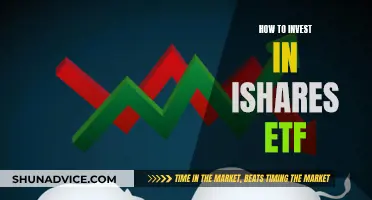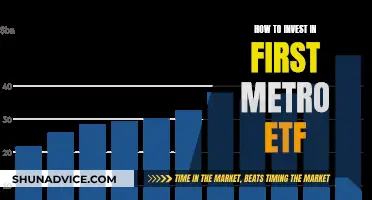
Exchange-traded funds (ETFs) can be a good option for investors looking to build a defensive trade strategy during a recession. While no investment is entirely recession-proof, some ETFs may be better equipped to weather an economic downturn than others. Here are some factors to consider when choosing an ETF to invest in during a recession:
- Broad diversification: Look for ETFs that track defensive indexes and offer exposure to a wide range of sectors, such as healthcare, consumer staples, and utilities, which tend to be more resilient during recessions.
- Strong performance and long-term gains: Opt for ETFs with a strong track record of performance and the potential for long-term gains.
- Low expense ratios and high assets under management (AUM): ETFs with low expense ratios and high AUM can provide better value and stability.
- Risk tolerance and investment strategy: Consider your risk tolerance and ensure that the ETF aligns with your investment strategy and portfolio diversification goals.
- Vanguard Dividend Appreciation ETF (VIG)
- Health Care Select Sector Fund SPDR ETF (XLV)
- Consumer Staples Sector ETF (XLP)
- iShares US Healthcare Providers ETF (IHF)
- Vanguard Consumer Staples ETF (VDC)
- Vanguard S&P 500 ETF (VOO)
- Vanguard Growth ETF (VUG)
What You'll Learn

Consumer staples ETFs
Consumer staples exchange-traded funds (ETFs) are a good option for investors looking to diversify their portfolios during a recession. These ETFs invest in stocks of companies that operate in the consumer staples industry, selling or producing essential goods like food, beverages, tobacco, consumer goods, and hygiene products. They also include companies in the food and drugstore retail business, as well as supermarkets and hypermarkets.
- The Consumer Staples Select Sector SPDR ETF (XLP): This ETF tracks the performance of the Consumer Staples Select Sector Index and has total assets of $14.2 billion as of April 26, 2024. Its top holdings include The Procter & Gamble Co., The Coca-Cola Co., and Walmart Inc.
- The Vanguard Consumer Staples ETF (VDC): With total assets of $9.7 billion as of March 31, 2024, this ETF tracks the performance of the MSCI US Investable Market Index/Consumer Staples 25/50. Its top holdings include The Procter & Gamble Co., Costco Wholesale Corp., and Walmart.
- The Invesco Food & Beverage ETF (PBJ): This ETF tracks the performance of the Dynamic Food & Beverage Intellidex Index, which includes 30 U.S.-based food and beverage companies. It has total assets of $128.5 million as of April 30, 2024, and its top holdings include Kroger Comp., Kraft Heinz Co., and Constellation Brands Inc.
- The First Trust Consumer Staples AlphaDEX Fund (FXG): With total assets of $669.1 million and an expense ratio of 0.64%tracks the StrataQuant Consumer Staples Index. Its top holdings include Mckesson Corporation, Performance Food Group Company, and Darling Ingredients Inc.
- The First Trust Nasdaq Food & Beverage ETF (FTXG): This ETF tracks the Nasdaq U.S. Smart Food & Beverage Index and has total assets of $907.8 million. Its top holdings include Kellogg Company, Archer-Daniels-Midland Co., and Molson Coors Beverage Company.
- The iShares S&P Global Consumer Staples ETF (IXI): This ETF is offered by Stockspot as their preferred consumer staples ETF.
A Monthly Guide to ETF Investing
You may want to see also

Healthcare ETFs
The healthcare sector is generally considered to be recession-proof. During a recession, as consumer needs shift, people still seek medical services, and health insurance commonly covers a portion of out-of-pocket healthcare costs. The demand for healthcare is also stable and growing, thanks to an ageing population in North America and Europe.
- IShares US Healthcare Providers (IHF): With total assets of $799.5 billion as of April 26, 2024, this ETF tracks the performance of the Dow Jones U.S. Select Health Care Providers Index. It has a dividend yield of 1.14% and an expense ratio of 0.40%. UnitedHealth Group, Inc. (UNH) is the top holding, with Elevance Health Inc. (ELV) and Cigna Corp. (CI) also featuring.
- Vanguard Health Care ETF (VHT): This ETF has a low-cost structure, with a 0.10% expense ratio and $17 billion under management. It has a more diverse range of holdings than other healthcare ETFs, with hundreds of individual stocks, which can offer some protection from recession risk. UnitedHealth and Johnson & Johnson are the biggest holdings.
- IShares U.S. Medical Devices ETF (IHI): This $6.1 billion fund has performed well in 2023 and over the last five years, with returns of around 5% and 11% respectively. It has a moderate expense ratio of 0.39%. Thermo Fisher Scientific Inc. (TMO) and Abbott Laboratories (ABT) are the top holdings.
- IShares Global Healthcare ETF (IXJ): This market-cap-weighted global healthcare ETF focuses on developed markets. It has delivered 10% annual returns over the last five years and has a moderate expense ratio of 0.4%. Six of its top 10 holdings are U.S.-based, with Swiss and British companies also featuring.
- IShares Biotechnology ETF (IBB): This ETF focuses on the volatile biotech sector, with holdings including COVID vaccine makers Moderna Inc. (MRNA) and BioNTech SE (BNTX). It has delivered steady returns, beating the similar SPDR S&P Biotech ETF over the medium and long term.
A Beginner's Guide to Silver ETF Investing
You may want to see also

High-dividend ETFs
Understanding High-Dividend ETFs
Benefits of High-Dividend ETFs During a Recession
During a recession, high-dividend ETFs can offer several benefits to investors:
- Regular Income: High-dividend ETFs provide investors with a steady stream of income through dividend payments, which can be especially valuable during economic downturns when stock prices may be falling.
- Potential for Lower Volatility: Some high-dividend stocks exhibit lower volatility compared to growth-oriented stocks. This is because they often belong to more defensive sectors, such as consumer staples, healthcare, and utilities, which tend to be less sensitive to economic cycles.
- Mitigating Risk: Investing in high-dividend ETFs can be a strategic way to reduce risk during a recession. These ETFs focus on companies with strong balance sheets, healthy cash flows, and a history of consistent dividend payments, making them more resilient during difficult economic periods.
Examples of High-Dividend ETFs
- VanEck Durable High Dividend ETF (DURA): This ETF tracks the Morningstar U.S. Dividend Valuation Index, focusing on companies with high dividend yields, strong balance sheets, and attractive valuations. It has a higher-than-average weighting in defensive sectors like healthcare, consumer staples, and utilities.
- Invesco S&P 500 High Dividend Low Volatility ETF (SPHD): SPHD selects the 50 stocks in the S&P 500 with the highest yield and lowest one-year trailing volatility. It provides a high 30-day SEC yield of 4.1%, making it attractive for income-seeking investors.
- Vanguard Dividend Appreciation ETF (VIG): VIG includes U.S. companies that have increased dividend payments for at least the past 10 years. It holds stocks of well-known companies like Microsoft, Apple, and Broadcom.
- IShares Global Consumer Staples ETF (KXI): KXI provides exposure to global consumer staples companies, including U.S. giants like Procter & Gamble, Coca-Cola, and Walmart, as well as international competitors such as Nestle, Unilever, and L'Oreal.
- Invesco S&P 500 Low Volatility ETF (SPLV): SPLV owns the 100 stocks in the S&P 500 with the lowest one-year trailing volatility, resulting in an overweight allocation to defensive sectors like utilities, healthcare, and consumer staples. It pays a monthly distribution with a 30-day SEC yield of 1.9%.
Considerations
While high-dividend ETFs can provide benefits during a recession, it's important to consider the following:
- Yield vs. Profitability: Avoid ETFs that solely focus on high yield without considering profitability and balance sheet quality. Look for ETFs that prioritize companies with strong fundamentals, consistent dividend growth, and sustainable payout ratios.
- Diversification: Ensure the ETF provides adequate diversification across different sectors and industries. Overconcentration in a specific sector can increase risk, especially during a recession when certain sectors may be more vulnerable.
- Expense Ratios: Pay attention to the expense ratios charged by the ETF. While high-dividend ETFs can provide attractive yields, high expense ratios can eat into your returns over time.
Psychedelic Medicine: Investing in the PSYK ETF
You may want to see also

Money market ETFs
Diversification and Risk Mitigation
Capital Preservation and Liquidity
Income Generation
While money market ETFs may offer lower returns compared to riskier investments, they can still provide a steady stream of income through interest or dividend payments generated by the underlying securities. This income can be especially valuable during a recession when other sources of investment income may be less reliable.
Interest Rate Sensitivity
Examples of Money Market ETFs
- IShares Short Treasury Bond ETF (SHV)
- SPDR Bloomberg Barclays 1-3 Month T-Bill ETF (BIL)
- Vanguard Short-Term Corporate Bond ETF (VCSH)
- IShares Short-Term Corporate Bond ETF (IGSB)
- Schwab Short-Term U.S. Treasury ETF (SCHO)
In summary, money market ETFs can be a valuable addition to an investment portfolio during a recession, offering diversification, risk mitigation, capital preservation, and a steady stream of income. However, it's important to remember that even these low-risk investments carry some level of interest rate and credit risk, and investors should carefully consider their own risk tolerance and investment goals before making any decisions.
Triple-Leveraged ETF: Research for Smart Investing
You may want to see also

Ethical ETFs
While there is no such thing as a "recession-proof" investment, ethical exchange-traded funds (ETFs) can be a good option to consider during a recession. Here are some things to keep in mind and some specific ethical ETFs to look into:
Understanding ETFs and Recessions
ETFs are a type of investment fund that holds a collection of stocks or bonds and is traded on an exchange. They can be a great way to diversify your portfolio and manage risk. During a recession, certain sectors tend to be more resilient, such as healthcare, consumer staples, utilities, and information technology.
Tips for Investing in Ethical ETFs During a Recession:
- Focus on defensive sectors: Look for ethical companies in sectors like healthcare, consumer staples, and utilities, which tend to be more stable during economic downturns.
- Consider broad funds: Investing in broad-based ethical funds can help reduce recession risk by diversifying your portfolio across multiple sectors and industries.
- Evaluate financial metrics: When selecting individual ethical stocks or funds, consider factors such as low debt, profitability, strong balance sheets, and positive cash flow, which can indicate a company's ability to weather economic downturns.
- Think long-term: Remember that investing is a long-term strategy. While there may be short-term volatility during a recession, ethical companies with strong fundamentals can recover and provide long-term growth.
Examples of Ethical ETFs to Consider During a Recession:
- IShares Global Healthcare ETF (IXJ): This ETF provides exposure to global healthcare companies, including pharmaceutical and medical device businesses, which tend to be more resilient during economic downturns.
- IShares Global Consumer Staples ETF (KXI): This ETF invests in companies that provide essential products, such as food, household goods, and personal care items, which consumers continue to purchase even during recessions.
- Vanguard Long-Term Treasury ETF (VGLT): This ETF focuses on long-term Treasury bonds, which can be a stable investment during recessions as the Federal Reserve tends to cut interest rates to stimulate economic growth.
- Invesco Food & Beverage ETF (PBJ): This ETF tracks the performance of the food and beverage industry, which includes consumer staples companies that can be resilient during economic downturns.
- Vanguard Dividend Appreciation ETF (VIG): This ETF includes companies that have consistently increased their dividend payments over time, indicating financial stability and a commitment to returning value to shareholders.
- IShares ESG Advanced MSCI USA ETF (ESGU): This ETF tracks an index of large and mid-sized US companies that meet certain environmental, social, and governance (ESG) criteria. It can provide exposure to ethically minded businesses across various sectors.
Remember to do your own research and consult with a financial advisor to determine if these or other ethical ETFs align with your investment goals and risk tolerance during a recession.
ETF Investment Strategies: ProShares vs Direxion
You may want to see also
Frequently asked questions
Some ETFs that may be recession-proof include the Vanguard Dividend Appreciation ETF (VIG), the iShares US Healthcare Providers ETF (IHF), and the Vanguard Consumer Staples ETF (VDC).
Yes, investing in ETFs that track defensive sectors such as healthcare, consumer staples, and utilities can be a good strategy during a recession. For example, the Health Care Select Sector Fund SPDR ETF (XLV) and the Consumer Staples Sector ETF (XLP) are options in this category.
ETFs offer a few advantages during a recession. They provide instant diversification, allowing you to own a basket of stocks from various industries, which can help mitigate risk. ETFs are also simple to understand and trade like stocks, offering high liquidity and tax advantages compared to mutual funds. Additionally, ETFs typically have lower expense ratios, making them a cost-effective investment option.







